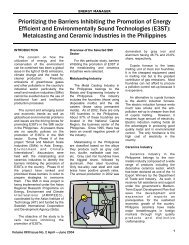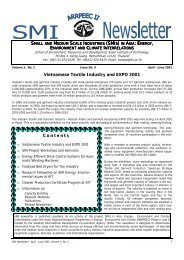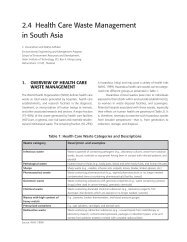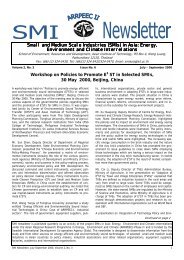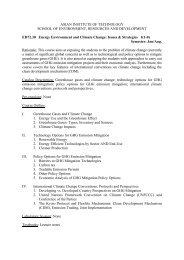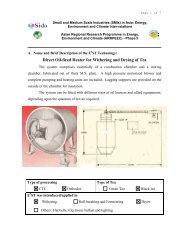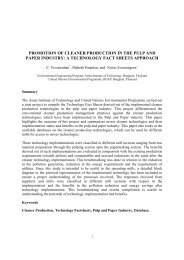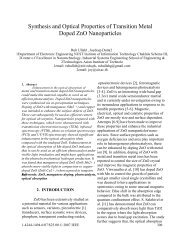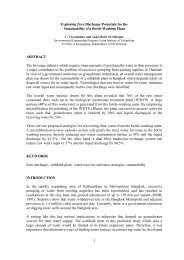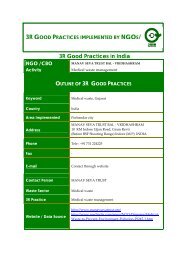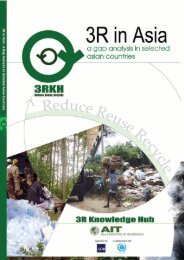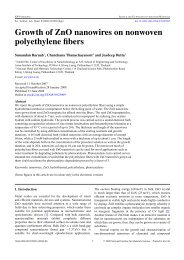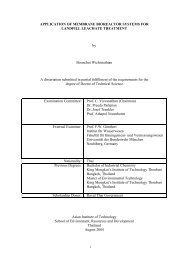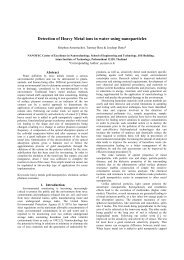Healthcare Waste Report - Environment Health
Healthcare Waste Report - Environment Health
Healthcare Waste Report - Environment Health
Create successful ePaper yourself
Turn your PDF publications into a flip-book with our unique Google optimized e-Paper software.
CONCLUSION<br />
Evidently, healthcare waste management is a<br />
subject of concern among all developing<br />
member countries of the TWGSHW. Though<br />
some countries are ambitious about taking<br />
healthcare waste management progressively,<br />
they either lack knowledge, strategies,<br />
legislations, budgets or a mix of all. As<br />
mentioned in the earlier sections of this<br />
report, some simple management practices,<br />
presented in this chapter, when directly<br />
replicated with little modification to suit the<br />
local needs, can yield striking results. For<br />
example, the waste segregation at source and<br />
recycling initiatives of Hospital Lam Wah Ee,<br />
Malaysia provides an easily replicable model<br />
for any hospital of similar scale in any Asian<br />
country, given the commonality in waste<br />
composition and generation. Conversely, the<br />
recycling of used syringes in a hospital at<br />
Pakistan turns out to be a red alert for an<br />
inattentive case of healthcare waste disposal.<br />
Technical difficulties in treatment are assumed<br />
to be complicated and deliberated to be the<br />
foremost obstacle in healthcare waste disposal.<br />
Real time examples where changes in<br />
collection and segregation of the waste have<br />
enormously reduced the amount of waste<br />
requiring ultimate treatment. A mere change<br />
in the practice with little or no investment<br />
could eventually result in a significant<br />
reduction in the final treatment cost, for<br />
example the case of hospitals in Europe<br />
provided earlier.<br />
<strong><strong>Health</strong>care</strong> waste management experiences in<br />
India, such as the Biomedical <strong>Waste</strong><br />
Management Rules, biomedical waste<br />
management in the national capital Delhi and<br />
the training programme offered by IGNOU<br />
are all inspiring and open avenues for further<br />
regional collaboration and knowledge<br />
exchange.<br />
Knowing very well, that the developing<br />
TWGSHW member countries are often faced<br />
with budget limitations, guidelines from IFC<br />
have been provided to present a picture of<br />
how investment agencies look at financing<br />
healthcare and healthcare waste management<br />
projects.<br />
In essence, this chapter has been structured to<br />
provide a bird’s eye view of healthcare waste<br />
happenings, not only in the region but across<br />
the world. The spirit of the chapter lies in<br />
understanding the factors that determine<br />
successful healthcare waste management<br />
through the few examples provided and<br />
replicating them in a national/local context<br />
without much reliance on external resources.<br />
CHAPTER 4_GLOBAL EXPERIENCES AND LESSONS TO LEARN<br />
122




